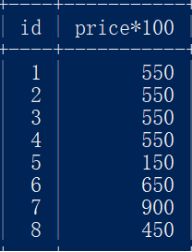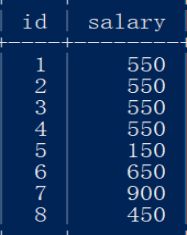2018秋招面试问题(十四、MySQL基础(3))
第四部分:触发器的操作
什么是触发器?
触发器是监听某种情况,触发某种操作。
创建触发器有四元素:一个监听地点(table)、一个监听事件(insert、update、delete)、一个触发时间(before、after)、一个触发事件(insert、delete、update)。
触发器是数据库对象之一,与函数非常类似,需要声明、执行。但是触发器的执行是由事件来触发的。
当表发生更改时,需要自动进行一些处理,比如每增加一条学生的记录,学生的总数就需要同时改变,这时候就要执行一次计算学生总数的操作。
触发器的操作包括创建触发器、查看触发器及删除触发器。
创建有一条执行语句的触发器:
create trigger trigger_dairytime before insert on product for each row insert into dairy values(NULL,'product',now());
这句话的意思是 对表product做任何操作都会触发触发器trigger_dairytime,使得在操作之前会先对表dairy插入一条当前时间的语句。for each row是指任何一个记录操作都会触发触发器。
创建完之后验证触发器是否起作用:
insert into product values(1,'apple',1.5);//向product插入数据
再查看dairy是否有插入一行时间信息:select * from dairy;
创建包含多条执行语句的触发器:
将$$设置为语句结束符:delimiter $$;
创建:create trigger trigger_dairytime2 after insert on product for each row
-> begin
-> insert into dairy values(NULL,'product',now());
-> insert into dairy values(NULL,'product',now());
-> end
-> $$
然后再输入:delimiter;//将结束符号还原为默认结束符号“;”
然后再向product中插入数据来检验触发器是否设置成功。
查看触发器:show triggers \G;
在系统数据库information_schema中存在一个存储所有触发器信息的系统表triggers,可以通过这个查询,
select * from triggers where trigger_name='trigger_dairytime' \G;
删除触发器:drop trigger trigger_dairytime;
完了再用show triggers \G;来查看
第五部分:数据的操作
插入完整数据记录:
insert into product(id,name,price) values(9,'pear2',5.0);
//字符串加单引号
或者是:
insert into product values(7,'apple2',9.0);
插入部分数据记录:
insert into product(name,price) values('peach2',4.5);
插入多条数据记录:
insert into product(id,name,price) values(...),(...),(...);
还可以插入另一个表的查询结果,来实现表数据值的复制功能,这两个表的个数和参数类型需一样:
insert into fruits(id,name,price) select product_id,pro_name,pro_price from product;
//向fruits表中插入product表中的信息
更新特定数据记录:
update product set price=6.5 where name='pear2';
//将product表中name为pear2的price更新为6.5
update product set price=5.5 where id<5;
删除特定数据记录:
delete from product where name='pea2';
delete from product;//把这里面的数据全删了
第六部分:单表数据记录查询
查询字段数据:
select id,name,price from product;//字段之间也可以交换顺序
查询所有字段数据:
select * from product;
加distinct 避免查询到重复的数据:
select distinct price from product;//加关键字distinct,去掉重复数据
实现四则运算数据查询:
select id,price*100 from product;
给price*100换一个可读性字段名:
select id,price*100 salary from product;
设置显示格式数据查询:
select CONCAT(id,'水果的总价:',price*100) salary from product;??
条件数据查询:
select name from product where price=5.5;
多条件的话可以加and或&&,或者是or等逻辑运算符。
带between和and的查询:
select name from product where price between 5 and 9;
查询不符合范围的数据记录:
select name from product where price not between 5 and 9;
空或非空查询:
select price from product where id is NULL;
select price from product where id is not NULL;
select price from product where not id is NULL;
带关键字in的集合查询:
select name from product where price in (5.5,4.5);
select name from product where price not in (5.5,4.5);
select name from product where not price in (5.5,4.5);
注意:对于关键字not in,如果集合中有NULL,则不会有任何查询结果。
Lile查询,like用来判断字段的值是否与指定的值相匹配。Like后面可以跟完整的字符,也可以支持“_”和“%”通配符,“_”匹配单个字符,“%”可以匹配任意长度的字符。
比如:
select name from product where name like 'p%';//查询name字段中以p开头的name
select name from product where not name like 'p%';//查询不以p开头的name
查询第二个字母为e的name:
select name from product where name like '_e%';
也可以用not like来查询不匹配的数据。
select name from product where name not like '%h%';
//查询不含字母h的name
select price from product where price like '%5%';
//查询price中包含数字5的
升序排序查询:
select * from product order by price asc;//price字段升序查询
不加asc也是默认的升序。
降序排序查询:
select * from product order by price desc;//price字段降序查询
多字段排序查询:
将price降序排列,如果price相等再按id降序排列:
select * from product order by price desc,id desc;
Limit来限制查询结果的数量:
- 不指定初始位置:
select * from product where price=5.5 limit 3;//限制三条记录
- 指定初始位置:
限制从满足条件的第二个记录开始,显示三条记录:
select * from product where price=5.5 order by price limit 1,3;
limit n 等价于 limit 0,n。
统计函数查询:
支持count()、avg()、sum()、max()、min()。统计函数都会忽略值为NULL的数据记录,但是不会忽略值为0的数据记录。
使用count():
查询表中的数据个数:
select count(*) number from product;
查询某个字段的个数:
select count(name) number from product;
还可以再加条件:
select count(price) number from product where price=5.5;
使用avg():
select avg(price) average from product;
还可以再加条件:
select avg(price) average from product where not price=0;//忽略掉0的情况
使用sum():
select sum(price) sumvalue from product;
使用max() min():
select max(price) maxval,min(price) minval from product;
注意:使用统计函数时,如果表中无数据,count会返回0,别的函数会返回NULL。
分组查询:
当字段中有重复值时,可将该字段分组查询:
select * from product group by type;
select group_concat(type) from product group by type;
//group_concat,是获取每组中指定参数的记录元素
显示出每个分组中的个数和名字:
select type,group_concat(name) names,count(name) number from product group by type;
实现多个字段分组查询:
select type,name from product group by type,name;
//首先按type分为6组,再对每组type针对name再分组
select type,name group_concat(name) names,count(name) from product group by type,name;
//获取每组中的记录元素,并统计记录数目
由type来分组,统计每组的平均price:
select type,avg(price) average from product group by type;
Having来实现条件分组查询,跟在group by的后面。having后面跟上条件:
由type分组显示出平均price大于5的名称和个数:
select type,avg(price) average,group_concat(name) names,count(name) number from product group by type having avg(price)>5;


